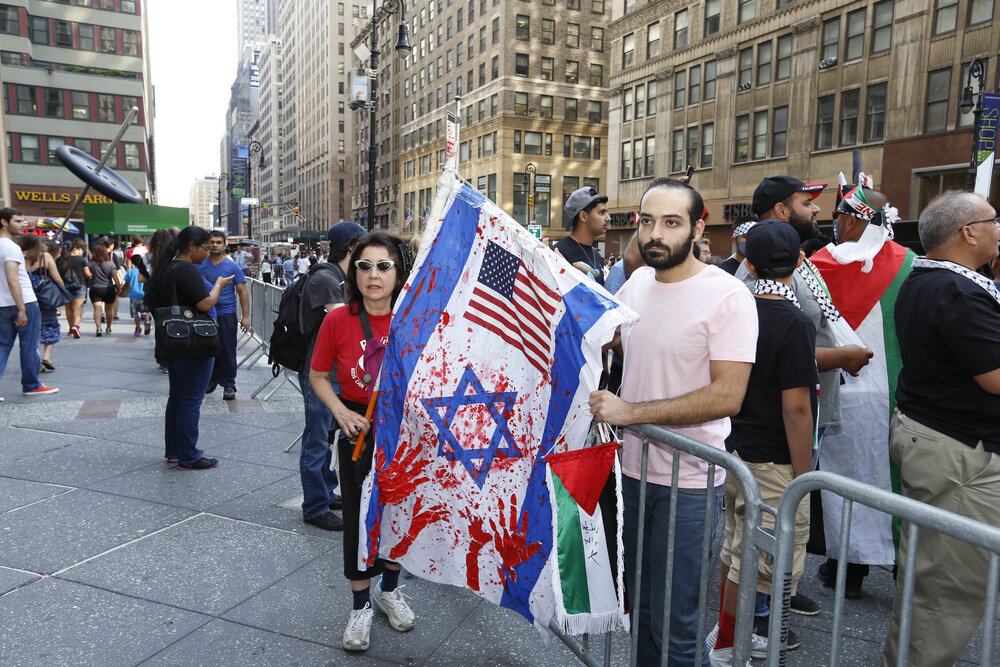Self-pity is an ugly thing, especially when it comes from the most well-off members of a community. It is even less pleasant when those wallowing in it are completely oblivious to the actual hardships of others. Such is the case with Shaul Magid’s Tablet article “The Enforcers,” in which the reader is expected to pity the poor anti-Zionists who – the horror – are sometimes accused of “not being Jewish enough,” while Jews around the world are daily being imperiled by a rise in violent anti-Semitism.
Currently, the debate around Zionism in the Jewish community is bigger than it has been in decades. This has been obvious to me through interactions with other Jews and viewing ongoing, seemingly never-ending social media debates. Only a few years ago, the question of how Israel could best achieve peace with the Palestinians was the only real subject of debate, while anti-Zionists were relegated to the fringes, where they belong, an area in the discourse they had inhabited since before the second world war. More and more, however, the question of whether Israel should exist has been entertained, increasingly openly. Just hours ago, the Jerusalem Post published an article with some frightening statistics from a recent poll: 28 percent of American Jews apparently believe Israel is an apartheid state (the number rises to 38 percent for those under 40), 23 percent think Israel is engaged in genocide (33 percent of those under 40), and 20 percent of American Jews under 40 actually believe that Israel doesn’t even have the right to exist at all.
Given this sad state of affairs, Magid’s article seems oddly timed. During a period when anti-Zionists are more vocal than at any point in decades, he frets that their voices are being pushed out by “enforcers,” supporters of Israel who, he argues, act as “gatekeepers of Zionist-Jewish identity [to] try to write out of Judaism anyone who doesn’t share their nationalist project.” While he argues that there are “thousands” of such mean-spirited articles, the reader is only shown a few minor examples. Regardless, Magid goes to great lengths to prove that Jewish anti-Zionists are real, actual Jews and that anti-Zionism has a long, Jewish history. In doing so, however, he states the obvious, overwhelmingly mischaracterizes Zionists’ views – and misses the most important point entirely.
Magid writes,
Those who demonize anti-Zionism today never quite define the term. Denial of a ‘Jewish’ state? Of Jewish chauvinism or Jewish supremacy? Of Israel itself? There is the theological anti-Zionism of ultra-Orthodoxy made explicit in the writings of the Satmar rebbe, Yoel Teitelbaum, the moral and anti-nationalist anti-Zionism of Hermann Cohen and Franz Rosenzweig, the secular anti-Zionism of the American Council for Judaism, the diasporist anti-Zionism of Judith Butler or Daniel Boyarin, and the anti-imperialist anti-Zionism of Noam Chomsky. Are they all the same? Of course not. All have different assumptions, different thought processes, and in some cases different goals.
He concludes this line of thought with, “But for the gatekeepers, nuance and distinctions don’t really matter.” Does anyone actually believe this? Are we actually expected to believe that the most vocal supporters of Israel actually make no distinction between the anti-Zionism of BDS leader Judith Butler and that of the Satmar rebbe? This is nonsense. Further, the same accusation could be made against the anti-Zionists. This group defines itself as opposed to Zionism, but do they engage with the “nuances and distinctions” Magid accuses Zionists of overlooking? Is the average anti-Zionist opposed to the Revisionist Zionism of Netanyahu’s Likud? The religious nationalist Zionism of Naftali Bennett’s Yamina party? Are they opposed to Rav Kook’s religious Zionism? Do they go so far as to oppose even the two-state, socialist Zionism of Israel’s Meretz Party? Do they make any distinction at all? There is no way to know.
Magid then turns to history. But for anyone who’s studied it – indeed, anyone who’s read Anne Frank’s diary – knows that there is a long history of religious and secular anti-Zionism. This is such common knowledge that it is hard to understand why Magid belabors the point in his article. What Magid does not ponder in his piece is the distinction between what anti-Zionism means now compared to what it meant then. Before Israel was re-founded, being an anti-Zionist didn’t mean advocating for the destruction of the state where nearly half the world’s Jewish population, millions of people who are periodically bombarded with rockets and who are surrounded on all sides by those who want to kill them, live. Instead, Magid marvels at how wonderful the diaspora is, writing, “There is now a thriving Jewish diaspora in North America, South America, Europe, Australia and elsewhere, one that is not dependent on Israel for its creative sustenance. This should be celebrated.” While I’m sure that Magid feels safe, such is not the case for many diaspora communities around the world. Here in the United States, arguably the place where, at least during the post-war years, Jews have had had better lives than in any other country, anti-Semitic violence is on the rise at a rapid clip. In Boston, not far from where I’m writing this, a rabbi was stabbed multiple times in broad daylight in front of a Jewish day school. In recent months and years, Jews have also been attacked in L.A., Pittsburgh, New Jersey, New York, and elsewhere across the U.S.
Still, American Jews have it good, at least compared to other Jews throughout history and to Jews in other countries. But this is what is so infuriating about Magid’s pity for the anti-Zionists who, from the comforts of (still mostly) safe American suburbs, have had their feelings hurt by those who, he imagines, say anti-Zionists aren’t “real Jews.” How will this Western self-pity come across to Jews in Israel, many of whom are only alive because they were able to make it there? How is the Ethiopian Jew who escaped to Israel supposed to understand the sorrows of the Western anti-Zionist? Or, indeed, one of the several thousand members of Beta Israel still in Ethiopia, constantly imperiled, hoping to make their way to Zion someday? But then, most of even the Western world is not the U.S. Forty percent of British Jews were considering emigration pending recent election results, mostly to Israel. Jews are fleeing rising anti-Semitism in France by droves each year – 5,000 in 2015 alone – mostly to Israel. How are they to understand elite liberal anti-Zionism and the sorrows of the sheltered upper-middle-class American Jews who seem to feel that they should be able to say whatever they want without anyone actually responding?
It appears that Magid is oblivious to these Jews and to history itself. For example, in mocking pre-war Zionists, Magid writes, “Josef Stalin once said that the Jews are not a nation because they lack two essential national attributes: language and territory. Many Zionists agreed!” Obviously, this is a mistake. Zionists disagreed with Stalin; they thought the reason Jews deserved territory was exactly because they are a nation; the anti-Zionists who thought assimilation was best were the ones who agreed with the red dictator. This is a small point; the bigger historical error is in failing to note that it was exactly because Jews had no territory that Stalin was able to deport thousands to Birobidzhan, a wretched place a week’s train ride away from Moscow, from where nearly all Jews fled as soon as they could. And, of course, the mass deportations were just a small part of the Soviet Union’s repression of Jews.
Magid spends paragraphs showing that these early Zionists, including ben Gurion, were not religiously observant Jews, and then sets his sites on contemporary Zionists. In arguing against the idea that Zionism is correct simply because most Jews support Israel (does anyone make the Zionist case this way?), Magid argues that most American Jews are not very observant and break halakha. So? That is between them and their rabbis – and it also is demonstrative of the point opposite that which Magid is trying to make. While many Zionists (myself included) argue that support for Israel is an important facet of Judaism, different Jews place various levels of emphasis on this. The other driving force of the Zionist movement is the demonstrably true belief that Jews, like all other peoples, need a nation state where they can actually be safe, and that state needs to be in the place where the Jewish nation formed. There are many different interpretations of what it means to be a good Jew. Far less negotiable, however, is the need for safety.
Despite arguing that Zionism isn’t correct or incorrect based on how many Jews support it, Magid spends time discussing how many younger Jews have negative impressions of Israel. Pointing out the complexities of geopolitics and how it vexes Jewish youth, Magid writes, “Israel is a complicated place for younger generations of Jews, especially but not only in America. Jews under the age of 50 do not know Israel other than as an occupying power. “ As the Post article shows, this is an accurate assessment of many young Jews’ understanding of Israel. These facts represent a two-fold problem, but not a failure of Zionism. Obviously, Jewish communal institutions need to do a better job educating young Jews. The number of young people (and not only the young) who think, for example, that Israel randomly decided to start ethnically cleansing Sheikh Jarrah, not realizing the complex history of court cases and titles and contested ownership, is astounding. Magid is correct in that the Zionist organizations have, by and large, not yet been able to properly educate other Jews about what Zionism means, but that is somewhat beside the point. The second part of the problem is the anti-Zionists themselves, many of them Jewish, who spread misinformation. One who knows nothing of Israel but what they read in the often anti-Semitic Jewish Currents will have a very skewed view indeed.
In truth, anti-Zionists aren’t being condemned as “not properly Jewish” or “not real Jews,” at least not often. Even the articles Magid linked to were for the most part not calling Jewish anti-Zionists “bad Jews” or “not real Jews.” It is telling that the article Magid quoted that most illustrates his complaints was written in large part by Natan Sharansky, the heroic Soviet Jew who spent nine years as a political prisoner in the USSR. On the other hand, this article only called anti-Zionists “indecent” and argued that anti-Zionism is anti-Semitism. Indeed, this is the biggest criticism of the anti-Zionists, whether they are Jews or not: anti-Semitism.
Perhaps it seems odd that here a group of Jews and a specifically Jewish publication are characterized as anti-Semitic. Anti-Zionism is anti-Semitism, at least in practice, even when the anti-Zionist has fond feelings for the Jewish people. As noted above, struggling for the abolition of the Jewish state either endangers (for Israelis) or removes the possibility of escape to (for Jews living precarious lives in oppressive states) safety for the majority of the world’s Jewish community. An ideology should be characterized by its results. In theory, Maoism sounds nice and egalitarian; in practice it is a death cult. Anti-Zionism has many iterations in theory, but in practice would lead to millions of dead or oppressed Jews living with dhimmi status. Magid writes in his essay, “I want to take the argument about anti-Zionism being antithetical to one’s Jewishness seriously.” He should take more seriously the argument that anti-Zionism is antithetical to millions of Jewish lives; he would then have a better understanding of why many Jews frown upon anti-Zionists.
Maybe this is what offends the Jewish anti-Zionist the most, the idea that they are themselves engaged in anti-Semitism, even if they are descended, as is Norman Finkelstein, from Holocaust survivors, even if they are themselves stellar Jews (however that is interpreted). This is not a concept unique to the Jewish community. One of the most popular left-wing writers on racism, Ibram Kendi, for example, makes the argument that Black people can in fact be racist, and they do so each time they support a racist policy. You can agree or disagree with Kendi on systemic racism and which policies are racist, but here his argument is sound: if you support policies or ideologies that are racist, you’re being a racist. And, analgously, if you support anti-Semitic ideologies, you’re being an anti-Semite, regardless of how good of a Jew you are.
Maybe that is what is most troubling to left-wing anti-Zionists.


